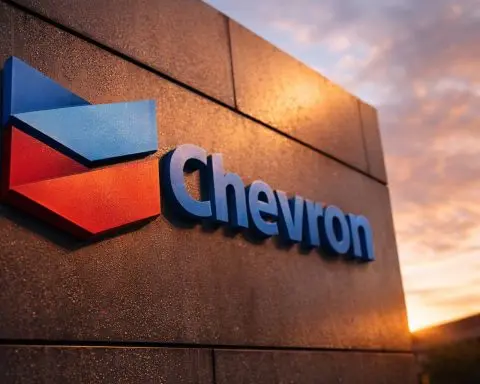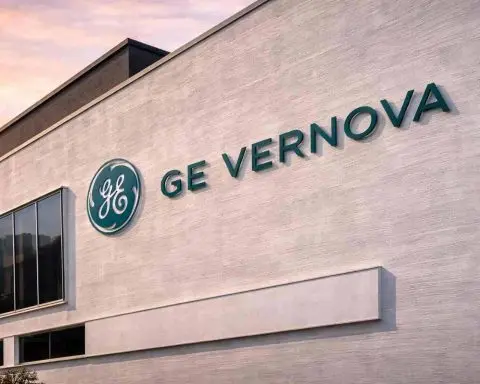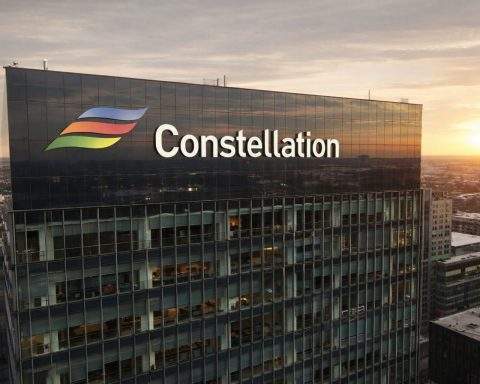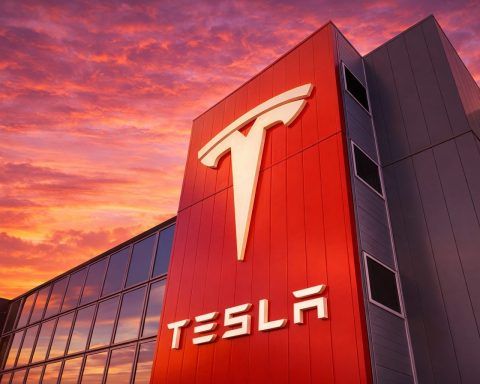Consumer Electronics & Big Tech Highlights
- Apple Shines Despite Tariffs: Apple projected stronger-than-expected sales for the current quarter, lifting shares, even as CEO Tim Cook warned new U.S. tariffs will add about $1.1 billion in costs this period reuters.com. Last quarter Apple’s revenue jumped nearly 10% to $94 billion, with iPhone sales up 13.5% (to $44.6 billion) after many customers bought early “related to the tariff announcements,” Cook noted reuters.com reuters.com. Apple’s finance chief said revenue should grow “mid to high single digits,” topping Wall Street’s ~3% forecast reuters.com. One analyst said the tariff-driven sales “pull-forward” was expected, yet “they still delivered exceptional results with iPhone growth,” underscoring Apple’s resilience reuters.com.
- Amazon’s AWS Underwhelms Investors:Amazon.com beat overall sales estimates and forecast strong Q3 revenue, but its cloud unit AWS failed to impress after rivals posted bigger gains reuters.com reuters.com. AWS revenue rose 17.5% to $30.9 billion (just ahead of forecasts), but profit margins slid to 32.9% (down sharply from 35.5% a year ago) reuters.com. Amazon’s stock plunged over 7% in after-hours trading on the results reuters.com reuters.com. “AWS is their growth engine and to see that drop in margin is dropping the stock,” observed Ken Mahoney of Mahoney Asset Management, adding that investors had hoped for “further fireworks” to drive shares to new highs reuters.com.
- Microsoft Hits $4 Trillion Value:Microsoft briefly became only the second company ever (after Nvidia) to reach a $4 trillion market capitalization following a blockbuster earnings report reuters.com. The stock jumped as much as 8% on robust growth in its Azure cloud business and strong demand for new AI-driven products, validating Microsoft’s big investments in next-gen technology reuters.com reuters.com. Shares are now up about 50% from spring lows. Analysts say Microsoft is “in the process of becoming more of a cloud infrastructure…and enterprise AI” leader – and doing so “very profitably”, which has supercharged its valuation reuters.com reuters.com.
Cybersecurity & Data Breaches
- Microsoft SharePoint Flaw Hits Governments: A recently revealed vulnerability in Microsoft SharePoint server software set off a wave of cyberattacks on public institutions worldwide. Over 90 U.S. state and local governments have been targeted via this bug in the past month reuters.com. Fortunately “none have resulted in confirmed security incidents,” according to the nonprofit Center for Internet Security reuters.com reuters.com. Still, the campaign is serious: the exploit claimed at least 400 other victims globally (including multiple U.S. federal agencies), and new targets are “being identified every day” as organizations scramble to patch systems reuters.com reuters.com. This week Fermilab, a U.S. energy lab, said hackers tried to breach its SharePoint but were quickly detected with “minimal” impact and no sensitive data accessed reuters.com.
- Cyberattack Disrupts French Telecom Giant:Orange S.A., which serves 290+ million customers, disclosed it was hit by an “unspecified” cyberattack that forced parts of its IT network offline techcrunch.com techcrunch.com. The breach was detected July 25 and immediately isolated, causing outages for some business and public sector clients in France techcrunch.com. By July 29, Orange said it was gradually restoring systems and had “no evidence to suggest that any internal or customer data has been exfiltrated.” techcrunch.com Regulators were notified per GDPR rules, and French authorities are investigating. The incident – following recent hacks on critical infrastructure – highlights rising threats to telecom networks techcrunch.com techcrunch.com.
Biotechnology & Health Tech Breakthroughs
- Lilly’s Blood Cancer Drug Outscores Rival: U.S. pharma company Eli Lilly announced that its new cancer pill Jaypirca outperformed AbbVie’s blockbuster Imbruvica in a head-to-head Phase 3 trial for chronic lymphocytic leukemia reuters.com reuters.com. Jaypirca achieved a higher overall response rate (tumor shrinkage/disappearance in patients) than Imbruvica, meeting the study’s primary goal of non-inferiority and hinting at superiority on some measures reuters.com reuters.com. Longer-term data on stopping disease progression are still being gathered reuters.com. Lilly plans to seek expanded approvals so doctors can use Jaypirca in more settings reuters.com. Analysts note Imbruvica brought in $3.35 billion last year versus $337 million for Jaypirca, but Lilly’s win could help the upstart drug become a new standard of care reuters.com.
- GSK’s $12 Billion Bet on Chinese Biotech: In a major East–West biotech alliance, Britain’s GSK will pay $500 million upfront to partner with China’s Jiangsu Hengrui on developing up to 12 new drugs reuters.com reuters.com. If GSK exercises all options and milestones are met, Hengrui could earn up to $12 billion over time reuters.com reuters.com. The deal gives GSK rights to Hengrui’s promising COPD drug HRS-9821 and 11 other candidates in oncology and immunology reuters.com. “This deal reflects our strategic investment in programmes that address validated targets…increasing the likelihood of success,” said GSK’s R&D chief Tony Wood, calling the approach a boost to its pipeline for cancer and respiratory diseases reuters.com reuters.com. News of the tie-up sent Hengrui’s shares up ~7–8% in Shanghai and Hong Kong, as Western pharma increasingly partners with China’s innovators reuters.com reuters.com.
Semiconductor Industry & Hardware
- Samsung’s $16.5 B Tesla Chip Deal & Tariff Relief: South Korea’s Samsung Electronics struck a $16.5 billion contract to supply advanced chips for Tesla, and cheered a new U.S.–South Korea trade pact that lowers uncertainty reuters.com reuters.com. “Building on this milestone, we anticipate securing additional orders from large customers,” Samsung VP Noh Mi-jung said of the Tesla win reuters.com. Samsung is investing in a Texas chip factory to fulfill the Tesla order, even as its overall Q2 chip profit plunged 94% amid a global slump reuters.com reuters.com. The company forecasts a second-half rebound driven by surging data-center chip demand (for electric vehicles and cloud computing) and believes a new 15% tariff cap in the U.S.–Korea trade deal will help stabilize its outlook reuters.com reuters.com.
- Nvidia Denies ‘Backdoor’ Chips Amid China Scrutiny:Nvidia pushed back after Beijing’s Cyberspace Administration summoned the company to address concerns that its new H20 AI chips might contain hidden “backdoors” for U.S. tracking reuters.com reuters.com. Chinese regulators warned that proposed U.S. rules requiring location-tracking in exported chips could jeopardize Chinese data privacy reuters.com reuters.com. In a statement, an Nvidia spokesperson insisted, “Cybersecurity is critically important to us. Nvidia does not have ‘backdoors’ in our chips that would give anyone remote access or control,” firmly denying any covert access features reuters.com reuters.com. Analysts noted the inquiry is largely symbolic – China still needs Nvidia’s high-end semiconductors and is unlikely to push the firm out entirely reuters.com reuters.com. The episode underscores rising U.S.–China tech tensions, just weeks after Washington briefly banned Nvidia’s H20 sales to China before reversing course reuters.com reuters.com.
- Intel Shake-Up in Manufacturing Brass: Struggling chipmaker Intel is overhauling its manufacturing leadership under new CEO Lip-Bu Tan. The company confirmed three senior Intel executives – Kaizad Mistry, Ryan Russell, and Gary Patton – will retire as part of a sweeping shake-up in its Technology Development group reuters.com. The reorganization, disclosed to staff on July 31, comes as Intel seeks to revive its lagging chip fabrication business. Intel’s new manufacturing chief, hired last year from Micron, has been cutting layers of management and is set to reduce the engineering workforce by around 22% (to ~75,000 employees) by year-end reuters.com. The retiring veterans’ roles will be consolidated as Intel aims to streamline operations and “resuscitate” its competitive edge reuters.com reuters.com. Investors are watching whether these moves – plus recent cost cuts and government subsidies – can accelerate Intel’s turnaround in the coming year.
Electric Vehicles & Transportation Tech
- Li Auto Unveils 6-Seat EV to Rival Tesla: Chinese automaker Li Auto launched its first purely electric SUV, the Li i8, marking a bold entry into the high-end family EV market ts2.tech. The six-seat Li i8 starts at ¥321,800 (≈$45,000) and is positioned squarely against Tesla’s Model Y – which, in a twist of timing, Tesla just began offering in a new 6-seat configuration in China ts2.tech. Li Auto, previously known for plug-in hybrids, touts the i8 as “an SUV of the new era” blending off-road, sedan, and MPV characteristics ts2.tech. Under the hood, it boasts an in-house dual-motor AWD platform. Two battery options (90.1 kWh and 97.8 kWh) deliver CLTC ranges of 670 km and 720 km respectively ts2.tech. Thanks to a proprietary 5C supercharging system, the i8 can add ~500 km of range in just 10 minutes – one of the fastest charging rates industry-wide ts2.tech. Li Auto has also installed 3,000+ fast charging stations across China to support the rollout ts2.tech. With premium trims up to ~$52k and a tech-loaded spec (including advanced driver assist and smart “agent” software), the Li i8 represents a major push by a rising Chinese EV star to steal market share from Tesla ts2.tech.
- Tesla Pilots Ride-Hailing (No Robotaxis Yet):Tesla quietly launched a ride-hailing service in the San Francisco Bay Area, allowing riders to summon human-driven Teslas via the company’s app reuters.com reuters.com. Elon Musk announced, “You can now ride-hail a Tesla in the SF Bay Area, in addition to Austin,” referring to Tesla’s similar pilot program in Texas reuters.com. Notably, California regulators have not permitted Tesla to operate fully self-driving taxis for paying customers yet reuters.com reuters.com. In fact, the state’s Public Utilities Commission warned Tesla that it must run a drivered pilot and obtain special permits before any robotaxi service – a process that took competitors like Waymo years reuters.com reuters.com. To comply, Tesla’s Bay Area program is currently limited to employees’ friends/family and select users, with drivers at the wheel. Musk’s pivot to offering a Lyft/Uber-style service (for now) comes amid cooling EV sales and mounting autonomous-car regulatory hurdles reuters.com reuters.com. Observers say it highlights Tesla’s eagerness to monetize its vehicles in new ways while its self-driving tech navigates a gauntlet of safety oversight.
Space Exploration & Aerospace
- SpaceX’s “Rocket Diplomacy” Misfires: A behind-the-scenes Reuters report revealed how SpaceX’s expansion plans hit a snag in The Bahamas ts2.tech. Elon Musk’s company had negotiated an agreement to land Falcon 9 boosters on Bahamian territory – even offering free Starlink internet units for the island nation’s defense force as a sweetener ts2.tech. But after SpaceX’s giant Starship rocket exploded during an April test flight (raining hundreds of debris fragments onto Bahamian waters and shores), officials put the deal on hold ts2.tech. Bahamian regulators grew concerned about safety and felt blindsided by a rushed approval process. “While no toxic materials were detected and no significant environmental impact was reported, the incident prompted a reevaluation of our engagement with SpaceX,” said the Bahamas civil aviation authority reuters.com reuters.com. The episode – the first public glimpse of SpaceX’s delicate dealings with foreign governments – shows how even as SpaceX dominates commercial spaceflight, local geopolitical and environmental concerns can ground its plans ts2.tech. Musk’s firm now faces increased skepticism abroad as it races to expand global launch sites.
- NASA Taps Startup Firefly for Moon Mission: NASA awarded Texas-based Firefly Aerospace a $176.7 million contract to deliver science payloads to the Moon’s south pole in 2029 ts2.tech. Under the mission (Firefly’s fourth under NASA’s CLPS program), Firefly will build a lunar lander – ferried by its new Elytra transfer vehicle – to deploy five NASA instruments on the Moon’s surface, and also release two small rovers to scout the region’s resources and terrain ts2.tech ts2.tech. This is Firefly’s second Moon contract; it successfully landed a smaller probe earlier this year, making it only the second private company (after SpaceX) to achieve a lunar landing ts2.tech. Notably, Firefly is planning to go public, and its rapid rise highlights the booming space startup scene. NASA officials said partnering with nimble commercial players “accelerate[s] deep space exploration by leveraging commercial efficiency,” a strategic shift for the agency as it eyes Artemis-era goals ts2.tech. The mission, nicknamed Blue Ghost Mission 4, will target the Moon’s south polar region – a hotspot for potential ice resources key to future human landings.
- Australia’s First Orbital Rocket Launch (Almost): On July 30, Gilmour Space Technologies conducted the maiden flight of Eris, which aimed to be Australia’s first homegrown orbital rocket ts2.tech. The 23-meter, 30-ton booster lifted off successfully from a new Queensland launch pad, but about 14 seconds into flight an anomaly triggered a termination of the mission ts2.tech. “Space is hard,” quipped CEO Adam Gilmour, noting even SpaceX and Rocket Lab needed multiple tries to reach orbit ts2.tech. Despite not making orbit, much of Gilmour’s hybrid rocket tech performed as designed, and the team gathered invaluable data for the next attempt ts2.tech. “We’ve learned a tremendous amount that will go directly into improving our next vehicle,” Gilmour said, adding a second rocket is already in production ts2.tech. With this test, Australia moves closer to joining the small club of nations capable of orbital launches. The near-miss also cements Gilmour Space as a key player in Australia’s nascent space industry, which until now has never sent a rocket to orbit.
Tech Antitrust & Legal Battles
- Opera vs. Microsoft – Browser Antitrust Fight: Norway’s Opera filed a formal complaint with Brazil’s antitrust regulator accusing Microsoft of unfairly bundling its Edge browser with Windows ts2.tech. Opera alleges Microsoft’s tactics make it difficult for users to switch default browsers, leveraging “dark patterns” in Windows that steer people away from rivals ts2.tech ts2.tech. “Microsoft thwarts browser competition on Windows at every turn… and then frustrates users’ ability to download and use alternative browsers,” Opera’s general counsel Aaron McParlan said in the filing ts2.tech. The complaint urges regulators to intervene and ensure a level playing field in the desktop browser market, echoing the EU’s prior browser-bundling case against Microsoft. Microsoft said it had no immediate comment on Opera’s claims ts2.tech. The case spotlights renewed scrutiny of Big Tech tying products to dominant platforms.
- Sony Sues Tencent Over Alleged Game Clone:Sony is taking China’s tech giant Tencent to court in the U.S., alleging Tencent’s upcoming game “Light of Motiram” is a “slavish clone” of Sony’s acclaimed Horizon Zero Dawn video game franchise ts2.tech. In a lawsuit filed July 25 in California, Sony claims Tencent’s game copies Horizon’s gameplay, story and artwork so closely that one reviewer dubbed the title “Horizon Zero Originality.” ts2.tech Sony is seeking damages and an injunction to block Tencent’s game, which is set for release in China. The clash pits a leading Western console game maker against one of Asia’s biggest mobile game studios, in what analysts say could be a high-profile test of intellectual property enforcement across borders. Tencent has not yet publicly responded to the allegations, and the case could spotlight the challenges of protecting game IP in the era of global game development.
- Epic vs. Google – App Store Ruling Upheld:Alphabet’s Google lost its appeal of a major antitrust decision involving its Play Store policies and Fortnite maker Epic Games reuters.com. On July 31, a U.S. federal appeals panel unanimously rejected Google’s arguments and upheld a 2023 jury verdict that found Google’s app store practices illegal reuters.com. The court affirmed an injunction requiring Google to allow third-party app stores and payment options within Android’s Play Store reuters.com reuters.com. “The record…was replete with evidence that Google’s anticompetitive conduct entrenched its dominance,” Judge M. Margaret McKeown wrote for the panel, saying the trial had shown Google stifled competition in mobile app distribution reuters.com reuters.com. The ruling is a significant win for Epic (which sued in 2020 after Fortnite was booted from Google Play) and adds to Google’s mounting antitrust battles – including separate cases by the U.S. DOJ and state AGs targeting its search and ad businesses reuters.com reuters.com. Google said it disagrees with the decision, warning that loosening Play Store rules could harm user security and experience, though it will now have to comply with the ordered reforms.
Digital Policy & Platform Governance
- EU Nixes “Big Tech” Network Fee Idea: The European Commission poured cold water on proposals to make Big Tech companies directly fund telecom networks reuters.com. After months of debate, an EU spokesman said Brussels “does not think that imposing a network fee on Big Tech is a viable solution” to finance the rollout of 5G and broadband reuters.com. The issue had pitted European telecom giants (like Deutsche Telekom, Orange, Telefónica) against U.S. tech firms (Google, Netflix, Meta, Microsoft, Amazon) in a fierce lobbying battle reuters.com. Telcos argued that bandwidth-hungry platforms should pay a “fair share” for network upgrades, while tech firms warned a fee would effectively become an internet toll. The Commission’s conclusion sides with the tech companies’ view that such fees won’t solve Europe’s infrastructure needs. EU officials signaled they’ll pursue other approaches to expand connectivity, leaving telecom operators disappointed. Spain and Germany had also publicly opposed the fee idea reuters.com. The EU’s decision likely shelves the so-called “fair share” levy for now, though the underlying question of how to fund costly rural 5G buildouts remains.
- UK Flags Amazon & Microsoft Cloud Dominance: Britain’s antitrust regulator found that Amazon Web Services (AWS) and Microsoft Azure control such a large share of the UK cloud market – 30–40% each – that competition is being harmed reuters.com reuters.com. A special inquiry panel of the Competition & Markets Authority (CMA) reported that technical lock-in and restrictive licensing practices (notably by Microsoft) make it hard for customers to switch cloud providers reuters.com reuters.com. Microsoft was singled out for using its dominance in enterprise software (Windows Server, Office 365, etc.) to handicap rivals by charging extra fees when its software runs on competing clouds like AWS or Google reuters.com reuters.com. The CMA panel recommended the regulator consider designating Microsoft and Amazon with “Strategic Market Status” in cloud services – a new label under UK law that would give the CMA stronger powers to curb anti-competitive behavior reuters.com reuters.com. However, the CMA said it likely won’t launch any new big cloud investigations until 2026 (when its Digital Markets Unit is fully operational) reuters.com. Both Amazon and Microsoft disputed the findings. The report adds to mounting pressure in Europe on big cloud providers to play fair and could foreshadow future regulations to spur cloud interoperability.
- Australia Bans Teens from Social Media:Australia is enacting a sweeping, first-of-its-kind law that will ban all minors under 18 from using social media. This week, the government decided to include YouTube under the upcoming ban’s scope, closing a controversial loophole ts2.tech. (YouTube was initially exempted on “educational” grounds, but regulators noted 37% of surveyed teens reported harmful content on YouTube – the highest rate among platforms ts2.tech.) Prime Minister Anthony Albanese declared “I’m calling time on it… I want Australian parents to know that we have their backs,” emphasizing a duty to protect kids online ts2.tech. The law – which takes effect in December – will require tech platforms to verify users’ ages and block those under 18, with hefty fines for non-compliance ts2.tech. Alphabet’s YouTube argues it’s “not social media” but a video library, and has hinted it may challenge the designation in court ts2.tech. Competing apps like Facebook, Instagram, Snapchat and TikTok (all covered by the ban) had lobbied for YouTube to be included, complaining the video site shares similar features and shouldn’t get a free pass ts2.tech. All eyes are on Australia as this bold experiment in teen online safety unfolds – potentially a precedent for other countries wrestling with social media’s effects on youth.
- Spain Purges 120,000 Illegal Airbnb Rentals: Spain’s government unveiled a major crackdown on unlicensed Airbnb listings, aiming to rein in a housing market disrupted by short-term rentals. Officials announced that Airbnb removed 65,000 listings which Spanish regulators had flagged in May for lacking proper tourism registration numbers ts2.tech. Authorities then identified another 55,000 or so illegal listings, bringing the total purged to nearly 120,000 – one of the largest enforcement actions against Airbnb to date ts2.tech ts2.tech. Spain’s consumer affairs minister praised the move, saying the government is putting “the constitutional right to housing over the profits of large multinational corporations.” Courts recently upheld Spain’s right to force the removals, after Airbnb tried to contest the purge in court and lost ts2.tech ts2.tech. Effective July 1, a new Spanish law requires all short-term rental listings to display an official license number, and most of the purged Airbnb listings failed to comply ts2.tech. Many Spanish cities blame unchecked vacation rentals for overtourism and soaring rents. Airbnb (which did not immediately comment) now faces one of its toughest regulatory crackdowns in Europe, as governments seek to assert control over the sharing-economy giant ts2.tech ts2.tech.
Tech Industry Deals & Startup News
- Figma’s Frothy IPO Signals Tech Revival: Collaborative design software maker Figma made a splashy Wall Street debut, with its shares surging ~158% on the first day of trading reuters.com reuters.com. The stock opened at $85 (well above the $33 IPO price) and at one point valued Figma around $50 billion – more than double the $20 billion price tag of its (aborted) acquisition by Adobe in 2023 reuters.com reuters.com. The blowout IPO is being heralded as a sign the U.S. tech IPO market is finally thawing after a years-long drought. “Fast-growing software IPOs have been extremely rare during the past three years, so deals like this tend to get a lot of attention,” said Matt Kennedy, IPO strategist at Renaissance Capital. “Because of this three-year bottleneck, tech IPO investors have been starved for new deals.” reuters.com Indeed, Figma’s successful listing – alongside a recent Instacart IPO – suggests investor appetite for high-growth tech names is returning. Figma’s IPO raised about $1.2 billion for the startup, which offers popular cloud-based design collaboration tools. The company’s strong fundamentals and 100%+ growth rate attracted heavy demand, with the deal reportedly over-subscribed. Market watchers say other tech “unicorns” may now accelerate IPO plans, riding on Figma’s coattails.
- Palantir Lands Up to $10 Billion Army Deal: In a big win for defense tech, the U.S. Army announced it will consolidate dozens of existing contracts into a single enterprise agreement with Palantir Technologies worth up to $10 billion over 10 years reuters.com. The new blanket deal gives the Army volume discounts and streamlined access to Palantir’s data analytics platforms, though it does not commit the Army to spend the full $10 billion reuters.com reuters.com. According to the Army, the goal is to shorten procurement timelines and eliminate duplicative contract fees so that it can deploy Palantir’s data integration and AI tools faster across the service reuters.com reuters.com. Palantir’s software is used for intelligence analysis, battlefield awareness and logistics by various Army units. By “pooling” its purchasing, the Army can rapidly scale Palantir solutions to new programs without separate bids each time. The deal reflects the Pentagon’s broader shift toward enterprise software buys (similar to its cloud JEDI/JWCC contracts). For Palantir, which was co-founded by Peter Thiel, the massive Army agreement solidifies its role as a go-to provider of military data systems. The company’s shares jumped on the news. Palantir CEO Alex Karp – who has championed working closely with Western governments – said the partnership will help “deliver cutting-edge capabilities to our warfighters” for years to come.
Sources: Connected news reports from Reuters, TechCrunch, CleanTechnica, and other reputable outlets reuters.com techcrunch.com ts2.tech ts2.tech reuters.com, covering developments in tech business, policy, and innovation worldwide on July 31 and Aug 1, 2025. Each link provides further details for verification.









